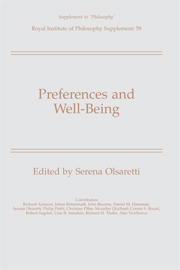Book contents
- Frontmatter
- Contents
- List of Contributors
- “Introduction”
- “Desire Formation and Human Good”
- “Preference Formation and Personal Good”
- “Leading a Life of One's Own: On Well-Being and Narrative Autonomy”
- “Well-Being, Adaptation and Human Limitations”
- “Consequentialism and Preference Formation in Economics and Game Theory”
- “Preferences, Deliberation and Satisfaction”
- “Content-Related and Attitude-Related Reasons for Preferences”
- “Reasoning with Preferences?”
- “Taking Unconsidered Preferences Seriously”
- “Preferences, Paternalism, and Liberty”
- “Preference Change and Interpersonal Comparisons of Welfare”
“Preference Change and Interpersonal Comparisons of Welfare”
Published online by Cambridge University Press: 07 May 2010
- Frontmatter
- Contents
- List of Contributors
- “Introduction”
- “Desire Formation and Human Good”
- “Preference Formation and Personal Good”
- “Leading a Life of One's Own: On Well-Being and Narrative Autonomy”
- “Well-Being, Adaptation and Human Limitations”
- “Consequentialism and Preference Formation in Economics and Game Theory”
- “Preferences, Deliberation and Satisfaction”
- “Content-Related and Attitude-Related Reasons for Preferences”
- “Reasoning with Preferences?”
- “Taking Unconsidered Preferences Seriously”
- “Preferences, Paternalism, and Liberty”
- “Preference Change and Interpersonal Comparisons of Welfare”
Summary
Introduction
Suppose that we agree that for questions of justice in a pluralistic society, we need a public standard of welfare. An appropriate public standard of welfare will have to meet the following two requirements. First, its conception of each person's welfare should, to the greatest reasonable extent, be something that each person can recognise as encompassing the things she wants for herself and as giving these things weights that reflect the relative importance she gives to them. Second, it should be sensitive to the fact that reasonable people hold conflicting conceptions of what constitutes an individual's welfare. It should therefore, to the greatest reasonable extent, respect neutrality of judgement by refraining from endorsing any particular conception of welfare as superior to any other.
In an influential set of essays, Richard Arneson (1990a, 1990b, 1990c) has argued that the following conception of welfare is ideally suited to these requirements: equate each individual's welfare with the degree of satisfaction of her ideally rational, self-regarding preferences. These are the preferences she would have on behalf of herself if she were to engage in ideally extended deliberation with full pertinent information, in a calm mood, while thinking clearly and making no reasoning errors (see Arneson 1990a, pp. 162–163). (For simplicity, in what follows, I will use the term ‘preferences’, to refer to these ideally rational, self-regarding preferences.)
Arneson argues that this standard of welfare meets the two aforementioned requirements in the best way possible.
Information
- Type
- Chapter
- Information
- Preferences and Well-Being , pp. 265 - 279Publisher: Cambridge University PressPrint publication year: 2006
